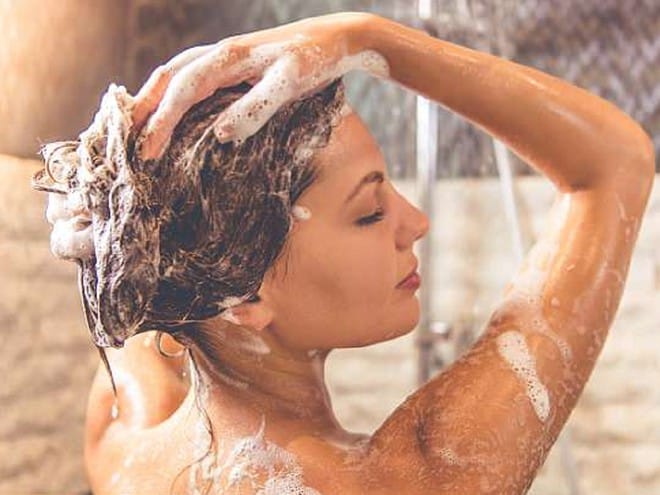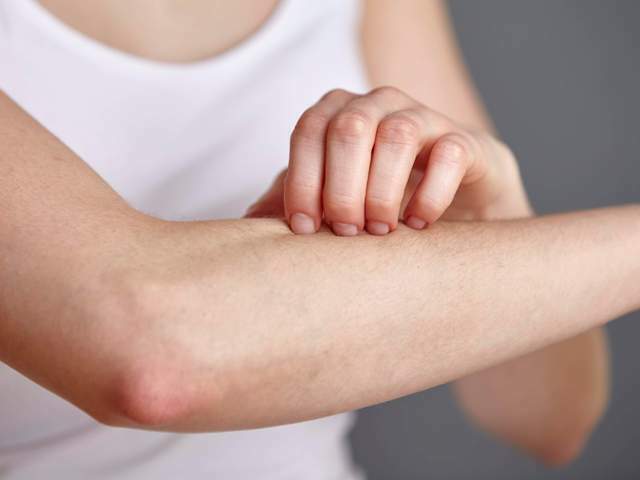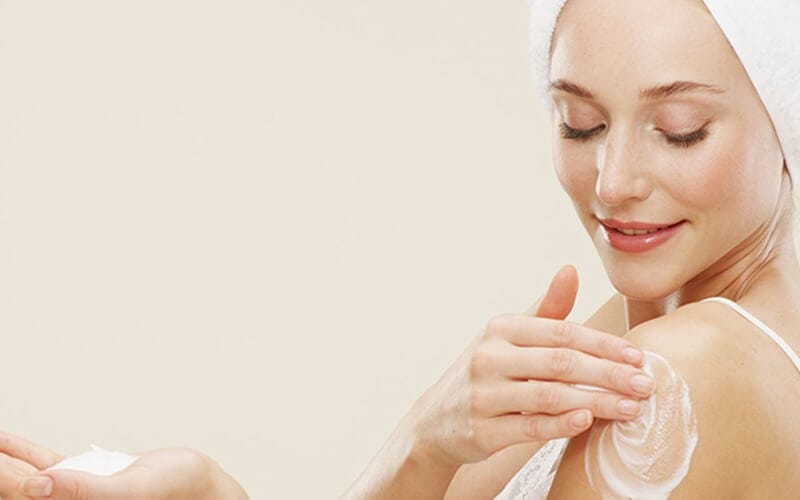
2. How much bathing is too much?
What dermatologists recommend above is that we should bathe every other day or a few times a week, but that doesn’t mean we all have to follow suit, right? Each person’s skin is different and can vary depending on factors such as hormones, environment, or the season.
For example, my skin tends to be dry in winter and when I’m taking acne medication, at that time I find that bathing too much will excessively dry out my skin. However, in summer and when I stop the medication, my skin returns to normal, so bathing every day is necessary.
Because there is no hard and fast rule for how much bathing is too much. The important thing is that we need to understand our own bodies and monitor how much our skin can tolerate.
Bathing too much can cause:
- Itching
- Dry and peeling skin
- Development of eczema and psoriasis
- Dry and brittle hair and lashes

Depending on personal needs, some people may feel that they cannot go a day without bathing. In that case, experts recommend bathing once a day.
Excessive bathing can also wash away essential oils. Some types of antibacterial soaps can wash away good bacteria. This causes dryness and can lead to rashes or eczema. The skin may become itchy, peeling, or red.
In addition, if someone already has a condition like eczema, bathing more than once a day will make the condition worse. Moreover, bathing too many times can wash away good bacteria on the skin, making infections more likely to occur.
Furthermore, health concerns are not the only reason we should reduce bathing. Bathing consumes a lot of water, to the point where we don’t realize it.
3. What happens if you don’t bathe enough?
Just as we can bathe too much, we can also bathe too little. We all know that bathing too little is for health reasons, but personal hygiene still needs to be taken care of.
The sweat glands cover the whole body, we sweat when we are hot, under pressure, hormonal and physical activity. Sweat itself has no smell until it combines with bacteria or remains on our skin. Huh
For example, I don’t have any smell even after not bathing for a day when I haven’t been very active and haven’t been sweaty. However, body odor is unavoidable if we don’t bathe for several days or a week, especially in areas like armpits.
Of course, we need to remember that the risk of body odor should not be the reason for bathing frequently. Poor personal hygiene can lead to the formation of dead, dirty, and sweaty areas on the skin. This can cause acne and potentially trigger conditions such as psoriasis, eczema, or inflammation of the skin.
Besides, bathing too little disrupts the balance between beneficial and harmful bacteria. Having too many bad bacteria on the skin also causes infection (it’s like washing away all the good bacteria when we bathe too much), leading to skin inflammation due to the accumulation of dirt on the skin from poor hygiene.
Bathing helps remove dead skin cells. When we don’t bathe enough, these cells cling to the skin and cause hyperpigmentation (scary).

Bathing too little can easily lead to skin diseases.
In conclusion, not bathing enough can cause:
- Body odor
- Acne
- Skin diseases: inflammation, eczema, psoriasis
- Infection
- Darkened or discolored areas of the skin
- Thick layers of dead skin.
4. So how should we bathe?
Here are some tips to bathe correctly and take care of our skin:
- Only bathe once a day (every other day is even better) if you’re not excessively sweating. On days when you don’t bathe, it’s important to wash your face and areas that are moist, such as armpits and groin, with a soft towel.
- Bathe with warm water, not hot water
- Take 5-10 minutes for bathing
- Use mild shower gel or soap, and make sure to rinse off all the soap thoroughly
- Avoid scrubbing the skin with a towel, pat gently and lovingly on the skin
- Avoid using scented soaps and shower gels. (This may be difficult for many people). If someone has sensitive skin, they may experience irritation.
- Apply moisturizer after bathing for soft, smooth, and healthy skin.

Moisturizer should be applied after bathing.
5. Conclusion
Each person has different needs, it’s really difficult for people who have the habit of bathing daily or those who don’t bathe enough to quickly change with a new habit. However, changing that for the sake of our own health is worth it, isn’t it?
Similarly, there is no formula or rule for how to bathe properly for everyone, so the wisest person is the one who listens to their own body, to love and pamper it.
If someone is experiencing skin problems mentioned above, such as rashes or irritation, try reducing the frequency of bathing. Or at least, reduce the bathing time to just 5-10 minutes.
Wish you all good health and more self-care and self-love!
Thank you for reading!
Source: Health Line



































